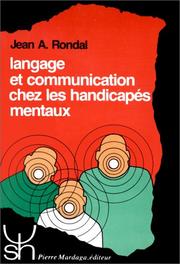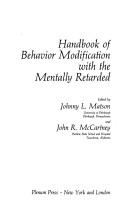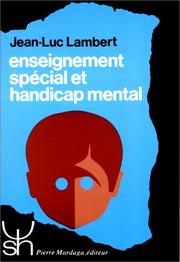| Listing 1 - 10 of 89 | << page >> |
Sort by
|
Book
ISBN: 2708973126 9782708973121 Year: 1979 Publisher: Toulouse Privat
Abstract | Keywords | Export | Availability | Bookmark
 Loading...
Loading...Choose an application
- Reference Manager
- EndNote
- RefWorks (Direct export to RefWorks)
Children with mental disabilities --- Education --- -Mentally handicapped children --- Mentally retarded children --- Retarded children --- Children with disabilities --- Youth with mental disabilities --- -Education --- Mentally handicapped children --- Children with mental disabilities - Education

ISBN: 2870092253 9782870092255 Year: 1985 Volume: 149 Publisher: Bruxelles : Pierre Mardaga,
Abstract | Keywords | Export | Availability | Bookmark
 Loading...
Loading...Choose an application
- Reference Manager
- EndNote
- RefWorks (Direct export to RefWorks)
Language acquisition --- People with mental disabilities --- -People with mental disabilities --- -Psycholinguistics --- Children with mental disabilities --- -Mentally handicapped children --- Mentally retarded children --- Retarded children --- Children with disabilities --- Youth with mental disabilities --- Language, Psychology of --- Language and languages --- Psychology of language --- Speech --- Linguistics --- Psychology --- Thought and thinking --- Intellectually disabled persons --- Mental disabilities, People with --- Mentally deficient persons --- Mentally disabled persons --- Mentally disordered persons --- Mentally handicapped --- Mentally retarded persons --- People with intellectual disabilities --- Retarded persons --- People with disabilities --- Mental retardation --- Mentally ill --- Acquisition of language --- Developmental linguistics --- Developmental psycholinguistics --- Language development in children --- Psycholinguistics, Developmental --- Interpersonal communication in children --- Psycholinguistics --- Language --- Means of communication --- Psychological aspects --- Acquisition --- -Mentally handicapped --- Means of communication. --- Means of communication for people with mental disabilities --- Communication --- Mentally handicapped children --- -Language acquisition --- Language acquisition. --- Psycholinguistics. --- Language. --- Orthopedagogiek --- fysieke handicaps. --- Kinderen (Geestelijk gehendicapte). Communicatie. --- Enfants déficients mentaux. Langage. --- Enfants déficients mentaux. Communication. --- Kinderen (Geestelijk gehandicapte). Taal. --- Fysieke handicaps. --- Communication orale --- Handicapés mentaux --- Mentally handicapped children - - Language --- Mentally handicapped - - Means of communication

ISBN: 2879391253 Year: 1997 Publisher: Paris Pierre terrail
Abstract | Keywords | Export | Availability | Bookmark
 Loading...
Loading...Choose an application
- Reference Manager
- EndNote
- RefWorks (Direct export to RefWorks)
Art brut --- Art, European --- Brutalist --- mentally handicapped --- personen met een mentale beperking --- art brut --- ruimtelijke kunst --- Art --- anno 1900-1999 --- outsider art --- Outsider art --- Painting.
Book
ISBN: 0309376866 9780309376860 9780309376853 0309376858 0309376882 Year: 2015 Publisher: Washington, D.C.
Abstract | Keywords | Export | Availability | Bookmark
 Loading...
Loading...Choose an application
- Reference Manager
- EndNote
- RefWorks (Direct export to RefWorks)
Children living in poverty are more likely to have mental health problems, and their conditions are more likely to be severe. Of the approximately 1.3 million children who were recipients of Supplemental Security Income (SSI) disability benefits in 2013, about 50% were disabled primarily due to a mental disorder. An increase in the number of children who are recipients of SSI benefits due to mental disorders has been observed through several decades of the program beginning in 1985 and continuing through 2010. Nevertheless, less than 1% of children in the United States are recipients of SSI disability benefits for a mental disorder. At the request of the Social Security Administration, Mental Disorders and Disability Among Low-Income Children compares national trends in the number of children with mental disorders with the trends in the number of children receiving benefits from the SSI program, and describes the possible factors that may contribute to any differences between the two groups. This report provides an overview of the current status of the diagnosis and treatment of mental disorders, and the levels of impairment in the U.S. population under age 18. The report focuses on 6 mental disorders, chosen due to their prevalence and the severity of disability attributed to those disorders within the SSI disability program: attention-deficit/hyperactivity disorder, oppositional defiant disorder/conduct disorder, autism spectrum disorder, intellectual disability, learning disabilities, and mood disorders. While this report is not a comprehensive discussion of these disorders, Mental Disorders and Disability Among Low-Income Children provides the best currently available information regarding demographics, diagnosis, treatment, and expectations for the disorder time course - both the natural course and under treatment.
Children with mental disabilities --- Poor children --- Mental health --- Children of the poor --- Economically disadvantaged children --- Children --- Mentally handicapped children --- Mentally retarded children --- Retarded children --- Children with disabilities --- Youth with mental disabilities --- Economic conditions
Book
ISBN: 3781559971 3781525554 Year: 2023 Publisher: Bad Heilbrunn : Verlag Julius Klinkhardt,
Abstract | Keywords | Export | Availability | Bookmark
 Loading...
Loading...Choose an application
- Reference Manager
- EndNote
- RefWorks (Direct export to RefWorks)
It is estimated that 50 -60 % of all adults with learning disabilities in Germany cohabitate with their relatives, mainly with their parents. Regional surveys confirm cohabitation often continues into the fifth decade of the disabled person's lifespan (vgl. Lindmeier et al. 2018). With the aging of the family members, the vulnerability of the family life situation increases. Changes are commonly initiated by the parents' decreasing health, directly affecting the parents ability of care intensity . Until now, science and practice have not developed suitable offers of support. In general, older families are subject to a problem-focused professional discourse and experience themselves confronted with normative regulations. While in the sociological discourse assumptions of normality regarding a family-biography are discussed critically, the work with families with disabled children still assumes a standardized family life cycle as a view on the support structure underlines. Offers of support for older families underestimate the biographical value of their life design and the desire of having this acknowledged, respected and noticed while exploring future perspectives. The presented example of biographical research explores the biographical meanings of living together with an adult disabled child from a parental perspective. The study follows the intention to generate a better understanding and above all appreciation for familiar realities, to support them developing perspectives for their future and to contribute to a new attitude towards older families. In this context family isn't defined as a stable institution (vgl. Fuhs 2002, 23) but as a making in the sense of doing family (vgl. Jurczyk/Lange & Thiessen 2014). In order to portray the diversity of family-life-stories, to reconstruct crisis and strategies of coping, to trace conceptions of 'being family' and to classify the social practice of living together, biographical research is chosen. This appears in the methodology as well as in the epistemological basis of this thesis. On the one hand, biographies are generated in a complex, dialectic interaction of individual acting and social structures. On the other hand, they structure individual acting in turn. Thus, living together can no longer be seen as a sole demonstration of individual action but is likewise socially contextualized. With this approach, the view for the diversity of families with disabled children is enhanced and the long term cohabitation is no longer interpretated as a demonstration of parental failure but as a manifestation of meaningful practice in which society participates at any time. To be able to comprehend the methodic procedure, this thesis starts with a detailed theoretical discussion of its main subjects that are "biography", "family", "older families", "residing/living circumstances" and "age/ageing". In a next step, conferring to the leading issue and the underlying conceptualization of biography, the chosen methods of research are explained. The narrative interview and the biographical case reconstruction according to Gabriele Rosenthal (2014) are eminently suitable to reflect the complex dialectic relation between social structure and individual behaviour inherent to biography. Thus, the thesis attempts to trace and to compare the social phenomenon of living together focusing on the genesis, the maintenance/perpetuation and the transformation, based on three detailed examples of biographies of older parents with disabled children. The presented results form the basis to derive consequences for a different approach to older families and ideas are discussed to adjust and/or reconstruct structures of support. The proposed approaches emphasize disabled people's right to a self-determined life, while they also respect the desire of many families to biographically continue their unique way of 'doing family', hence encouraging a "person and family"-centered planning process to be the future starting point. hence encouraging a "person and family"-centered planning process to be the future starting point.
Older people --- People with mental disabilities. --- Intellectually disabled persons --- Mental disabilities, People with --- Mentally deficient persons --- Mentally disabled persons --- Mentally disordered persons --- Mentally handicapped --- Mentally retarded persons --- People with intellectual disabilities --- Retarded persons --- People with disabilities --- Intellectual disability --- Mentally ill
Book
ISBN: 1909726419 1909726400 1909726397 9781909726390 9781909726413 Year: 2015 Publisher: London RCPsych Publications
Abstract | Keywords | Export | Availability | Bookmark
 Loading...
Loading...Choose an application
- Reference Manager
- EndNote
- RefWorks (Direct export to RefWorks)
This comprehensive work addresses the care and treatment of adults and children who have disorders of intellectual development (also known as intellectual or learning disabilities). It focuses specifically on the interface between intellectual disabilities and genetics, ageing, epilepsy and forensic psychiatry. A whole section is devoted to the diagnosis, assessment and treatment of autism spectrum disorders. Other topics include: comorbid mental health problems; behavioural problems; psychopharmacology; and service provision. There are references to the up-to-date evidence-based literature throughout the text which aims to inform clinical practice. Written by eminent clinicians and experts in their field, the majority of chapters were specially commissioned for this book, whilst a few have previously appeared in the journal Advances in Psychiatric Treatment (now known as BJPsych Advances) and have now been fully updated.
People with mental disabilities. --- Autism Spectrum Disorder --- Disabled Persons. --- Déficience intellectuelle. --- Intellectual Disability --- Intellectual Disability. --- Intellectual disability. --- People with disabilities. --- Personnes ayant une déficience intellectuelle. --- Personnes handicapées. --- Persons with Mental Disabilities. --- handicapped. --- intellectual disability. --- mentally handicapped. --- physically handicapped. --- Complications.
Periodical
ISSN: 08958017
Abstract | Keywords | Export | Availability | Bookmark
 Loading...
Loading...Choose an application
- Reference Manager
- EndNote
- RefWorks (Direct export to RefWorks)
Mental Retardation --- Mental retardation --- People with mental disabilities --- Déficience intellectuelle --- Handicapés mentaux --- Periodicals. --- Education --- Périodiques --- Mentally handicapped --- Intellectual Disability --- Periodicals --- Intellectual Disability. --- Deficience intellectuelle --- Handicapes mentaux --- Mental retardation. --- Education. --- United States. --- Health Sciences --- Pathology --- Clinical Medicine --- Health Sciences. --- Pathology. --- Déficience intellectuelle --- Handicapés mentaux --- Périodiques --- AAMR-E EJEDUCA EJMEDEC EJPSYCH EPUB-ALPHA-A EPUB-PER-FT MDPCHIAT --- Intellectual disability --- Mental retardation - Periodicals --- Mentally handicapped - Education - United States - Periodicals --- Intellectual Disability - periodicals --- Déficience intellectuelle.

ISBN: 0306406179 1461571324 1461571308 Year: 1981 Publisher: New York (N.Y.) Plenum
Abstract | Keywords | Export | Availability | Bookmark
 Loading...
Loading...Choose an application
- Reference Manager
- EndNote
- RefWorks (Direct export to RefWorks)
People with mental disabilities --- -People with mental disabilities --- -Children with mental disabilities --- -Mentally handicapped children --- Mentally retarded children --- Retarded children --- Children with disabilities --- Youth with mental disabilities --- Intellectually disabled persons --- Mental disabilities, People with --- Mentally deficient persons --- Mentally disabled persons --- Mentally disordered persons --- Mentally handicapped --- Mentally retarded persons --- People with intellectual disabilities --- Retarded persons --- People with disabilities --- Mental retardation --- Mentally ill --- Rehabilitation --- Behavior modification --- Children with mental disabilities --- Behavior therapy. --- Orthopedagogiek --- Behavior modification. --- Rehabilitation. --- mentale stoornissen --- -Rehabilitation --- mentale stoornissen.

ISBN: 2870091427 9782870091425 Year: 1981 Volume: 98 Publisher: Bruxelles : Pierre Mardaga,
Abstract | Keywords | Export | Availability | Bookmark
 Loading...
Loading...Choose an application
- Reference Manager
- EndNote
- RefWorks (Direct export to RefWorks)
Comment faire pour éduquer les sujets handicapés mentaux ? Depuis les efforts des précurseurs de génie que furent Itard, Seguin, Binet et Montessori, jusqu'à nos jours, la société a répondu de diverses manières à cette interrogation. Aujourd'hui, l'enseignement pour les handicapés mentaux revêt des formes multiples où s'entremêlent les principes, les méthodes et les didactiques. L'auteur s'interroge sur ces différentes méthodes d'enseignement, ainsi que sur la formation du personnel enseignant. Ce livre s'adresse aux enseignants spécialisés, parents, éducateurs, psychologues, médecins, logopèdes, etc.Jean-Luc Lambert, formé en Belgique et à l'étranger, il a animé une équipe de recherches à l'Université de Liège et consacre une part de ses activités à la formation de praticiens dans le domaine de l'arriération mentale.
Buitengewoon onderwijs --- Enseignement spécial --- Gehandicapten --- Handicapés --- Children with mental disabilities --- Children with disabilities --- Education --- Enfants handicapés mentaux --- -Children with mental disabilities --- -Mentally handicapped children --- Youth with mental disabilities --- Exceptional children --- -Children with disabilities --- Enfants handicapés mentaux --- Mentally handicapped children --- Mentally retarded children --- Retarded children --- Children with special educational needs --- Children with special health care needs --- Children with special needs --- Handicapped children --- Physically handicapped children --- Special needs children --- People with disabilities --- Enfants handicapés --- Children with mental disabilities - Education - Belgium --- Children with disabilities - Education - Belgium --- Enfants inadaptes --- Handicapes mentaux
Book
ISBN: 0839116373 0839116365 Year: 1980 Publisher: Baltimore University Park press
Abstract | Keywords | Export | Availability | Bookmark
 Loading...
Loading...Choose an application
- Reference Manager
- EndNote
- RefWorks (Direct export to RefWorks)
Mental retardation --- Children with mental disabilities --- People with mental disabilities --- Community mental health services --- Mentally handicapped --- Physiological aspects --- Care --- Congresses. --- Education --- -Mental retardation --- -Idiocy --- -Children with mental disabilities --- Intellectual disabilities --- Mental deficiency --- Developmental disabilities --- Psychology, Pathological --- Mentally handicapped children --- Mentally retarded children --- Retarded children --- Children with disabilities --- Youth with mental disabilities --- Intellectually disabled persons --- Mental disabilities, People with --- Mentally deficient persons --- Mentally disabled persons --- Mentally disordered persons --- Mentally retarded persons --- People with intellectual disabilities --- Retarded persons --- People with disabilities --- Intellectual disability --- Mentally ill --- Conferences - Meetings --- -Intellectual disability. --- Idiocy --- Care. --- Physiological aspects. --- -Intellectual disability
| Listing 1 - 10 of 89 | << page >> |
Sort by
|

 Search
Search Feedback
Feedback About UniCat
About UniCat  Help
Help News
News